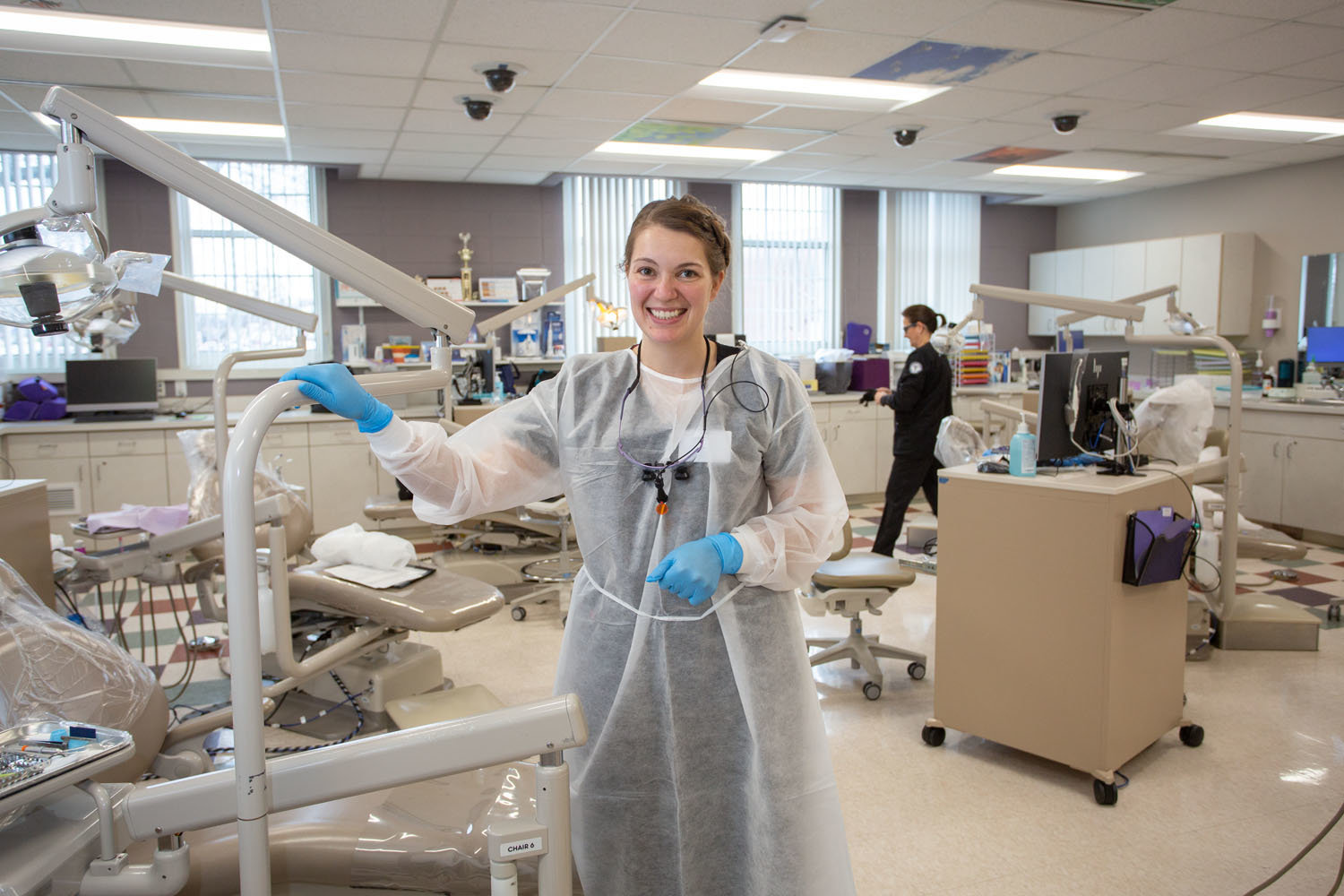YOUR BUSINESS AUTHORITY
Springfield, MO
YOUR BUSINESS AUTHORITY
Springfield, MO

Skylee White had never heard of the Fast Track Workforce Incentive Grant program until Aug. 23, 2019, the day she met Missouri Gov. Mike Parson.
Months later, she received nearly $2,000 in Fast Track aid for her dental hygienist studies at Ozarks Technical Community College.
White is one of 782 Fast Track applicants statewide for the program, as of Feb. 21. A large number of those – 283 people, or 36% of all state applicants – are from OTC.
“My goal is to not take out so many student loans, and Fast Track has provided that for me,” White said.
The 29-year-old mother of three is approved to receive more aid for the spring semester, but she’s waiting to learn the amount from the Missouri Department of Higher Education and Workforce Development, which administers the funds.
The program is designed to ensure college tuition and fees are fully covered for up to four semesters – when combined with other governmental financial aid. It’s geared for those ages 25 and older with an average annual household income not exceeding $80,000, for joint tax filers, or $40,000, for any other tax status.
Fast Track financial aid currently is available at more than two dozen public colleges, universities and vocational-technical schools throughout the state, said Zora Mulligan, Missouri’s Higher Education commissioner. OTC and Missouri State University are the two options in Springfield, she said.
Candidate potential
Mulligan spoke on Fast Track at the Momentum State of the Workforce luncheon Feb. 19 in Springfield. Her main point: There are many more potential candidates for the financial aid than the 700-plus who have applied so far. She said some 200,000 people in the state have never started college and another 110,000 haven’t finished their degrees.
“When A-plus was established, it created a pathway to college for a lot of students who may never have considered themselves college material,” Mulligan said of the A-plus scholarship program that waives community college tuition for two years. “Fast Track is intended to do the same thing for adults, who might be out in the workforce or not in the workforce, and might not see any kind of postsecondary education option. But there really is one now.”
The grants seek to help nontraditional students get degrees in high-demand fields, such as health care, advanced manufacturing and computer science.
Qualifying programs at OTC include accounting and business management, engineering, remanufacturing technology and nursing. At Missouri State University, programs in elementary education, agriculture business and finance are among those eligible.
OTC spokesman Mark Miller said the state has dispersed $26,456 for 22 students at the college to date. Another 70 students anticipate $118,632 in grant funding to cover either the fall 2019 or spring 2020 semesters.
Kelly Evans, associate director of financial aid at MSU, said 34 students had applied so far, and the state had dispersed $3,022 to four students.
Quick turnaround
After Fast Track rolled out in August – just as classes were beginning – the schools had to react quickly, said Jordan Schreiber, OTC’s director of student recruitment.
She said OTC had no expectations of applicant numbers, because Fast Track debuted after most students had secured financial aid.
“We just wanted to make sure that students knew this was available to them,” she said. “We’re seeing our first round of new students coming in now because of Fast Track and it’s really exciting.”
However, Schreiber said as the program moves into the spring semester, the disbursement process is speeding up.
Because of Fast Track, courses that normally would not receive financial aid are now eligible, she said, citing the certified nursing assistant and medical assistant training programs as examples.
Getting on track
OTC’s five-semester dental hygiene program is another eligible course under Fast Track.
With only 20 spots available, OTC has a selective admission process. White applied and was accepted last fall after being turned down in 2018.
The timing might have worked in her favor.
She said the financial aid she’s receiving through a federal Pell grant, bolstered by the addition of Fast Track money, is filling a vital need.
The Lebanon resident makes the trek to the Springfield campus several times a week for classes and labs. Upon graduation, White hopes to work as a dental hygienist in Lebanon.
“Without the financial support from these grants, hygiene school would not be possible for me by any means,” she said.
For out-of-district students in OTC’s dental hygienist program, like White, the cost is roughly $31,100, according to OTC officials.
State officials bill Fast Track as a workforce development tool to get participants skilled up in high-demand fields to keep the state competitive.
To help achieve that goal, the grant requires the student to maintain Missouri residency, at least a 2.5 cumulative GPA and achieve qualifying employment within 12 months of graduation. If they fall short of one of those goals, the grant becomes a loan to be repaid.
“They have to stay and work in Missouri for three years after they complete their program, which is hard, but we want to drive progress here in Missouri,” Mulligan said.
Connected to Watkins Elementary School is a new storm shelter now under construction.
Updated: Systematic Savings Bank to be acquired in $14M deal
STL construction firm buys KC company
Webster University's deficit triples
‘Dress for your day’: Companies are relaxing dress codes amid evolving ideas about fashion
Missouri House speaker accused of obstruction in ethics probe
Former CoxHealth colleagues starting communications firm
Developer targets opening by month's end for $10M apartment complex